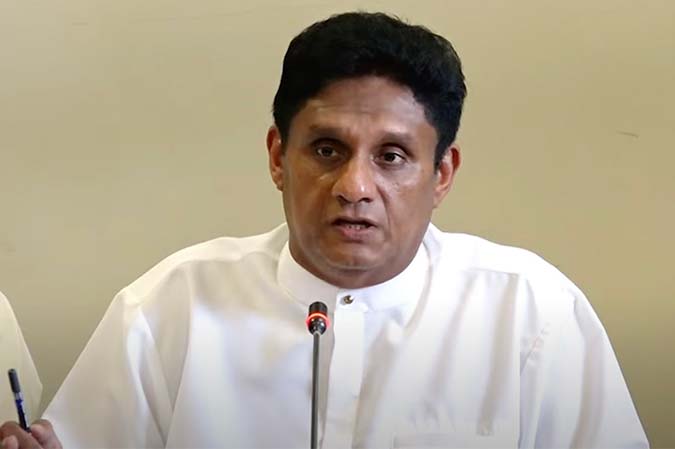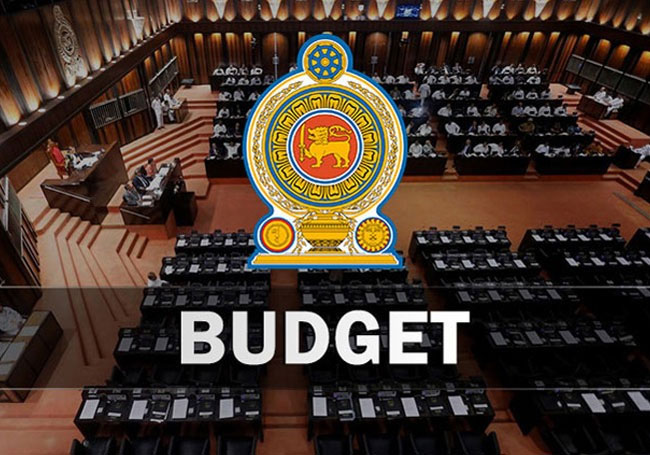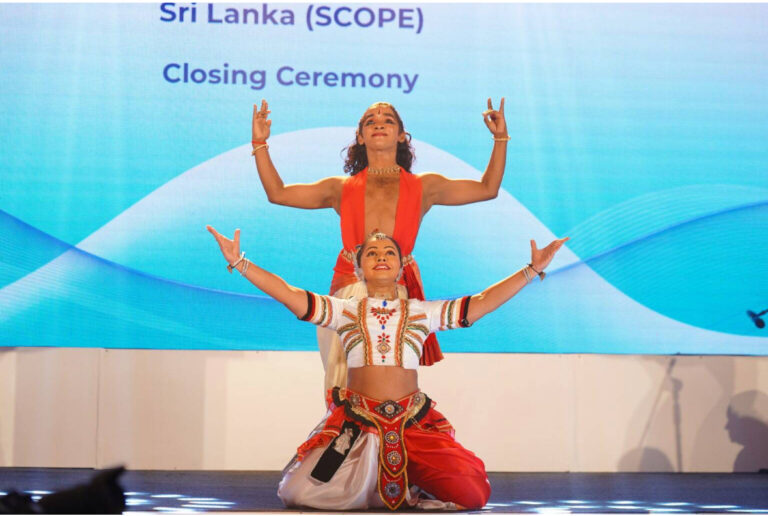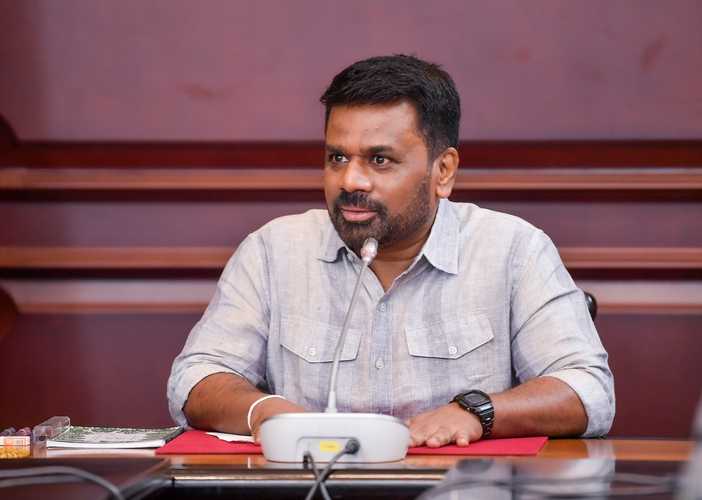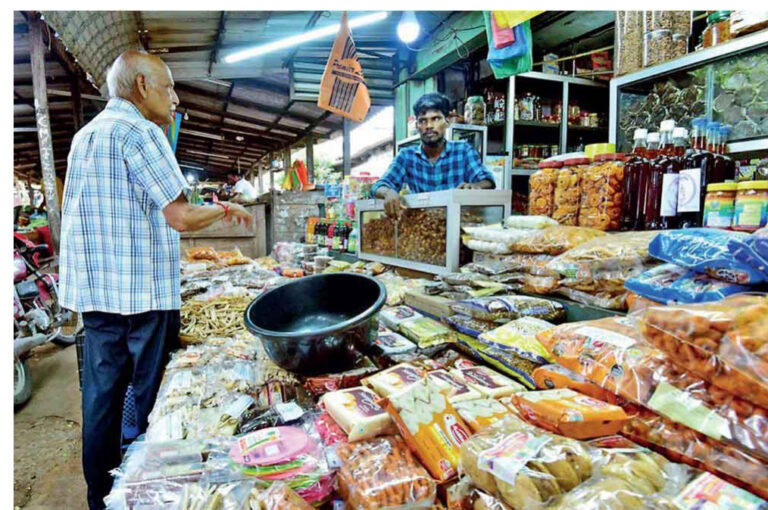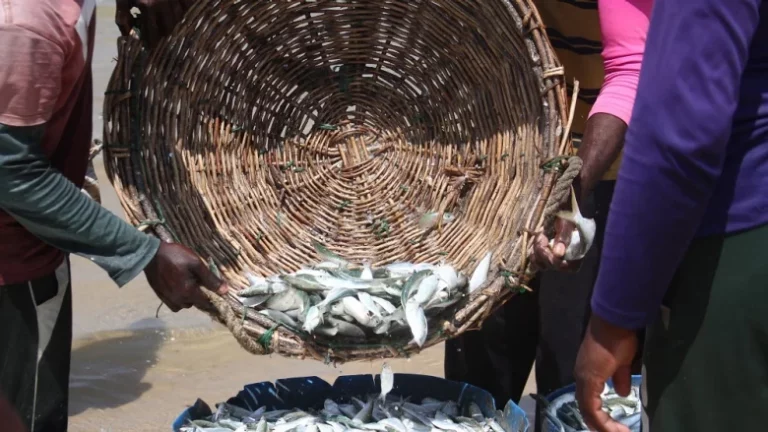November 06, World (LNW): The President of the World Economic Forum (WEF), Børge Brende, has cautioned that global markets could be heading towards three significant financial bubbles — in cryptocurrencies, artificial intelligence, and public debt — amid growing concern over recent turbulence in technology shares.
Speaking to journalists during a visit to São Paulo, Brazil’s financial capital, Brende noted that while investor confidence has remained strong for much of the year, current valuations in several sectors appear increasingly inflated.
“We may be on the verge of seeing three bubbles taking shape — one in the crypto market, another in artificial intelligence, and a third in the world’s mounting debt levels,” he said.
He further pointed out that government debt across many nations has now reached levels unseen since the end of the Second World War.
His remarks come after global technology stocks experienced sharp declines, prompting investors to reassess whether enthusiasm for innovations such as AI may have run ahead of fundamentals. Market experts, however, have urged restraint rather than alarm, emphasising that the recent corrections follow months of record-breaking highs driven by optimism about technological advances.
Brende acknowledged that artificial intelligence could revolutionise global productivity and unlock vast economic potential, but warned that the transition might bring social and employment challenges, particularly for office-based professionals.
“In a worst-case scenario, we could see new ‘rust belts’ forming in major urban centres where white-collar roles are most at risk from automation,” he explained, pointing to recent job reductions announced by large multinational corporations such as Amazon and Nestlé.
Nonetheless, Brende stressed that history shows technology-driven change ultimately fuels progress. “Every wave of innovation has disrupted employment patterns in the short term, but over time, rising productivity translates into broader prosperity,” he said. “Greater efficiency allows businesses to reward workers with higher wages and helps societies achieve more sustainable economic growth.”
World Economic Forum Chief Warns of Emerging Global Financial Bubbles
Opposition Leader Reaffirms Support for India’s Bid for Permanent UN Security Council Seat
November 06, Colombo (LNW): Opposition Leader Sajith Premadasa has reiterated his strong endorsement of India’s long-standing campaign for a permanent position on the United Nations Security Council (UNSC), describing such recognition as an acknowledgment of today’s geopolitical realities.
Speaking to India’s ANI news agency during his current visit to New Delhi, Premadasa noted that India’s inclusion in the top decision-making body of the UN would reflect the “practical realities of international politics.” He pointed out that his support for this proposal was not new, recalling that he had publicly advocated India’s permanent membership years ago.
Premadasa remarked that he always believed that India deserves a permanent seat at the Security Council. He emphasised that it is a matter of recognising India’s global influence, its contribution to international peace, and its growing economic and political strength. The world cannot ignore India, nor can it afford to sideline its voice in global decision-making, the Opposition Leader noted.
His comments come as New Delhi continues its diplomatic efforts to reform the UNSC, arguing that the current structure does not adequately represent the interests and aspirations of developing nations or emerging powers in Asia, Africa, and Latin America.
Responding to a question on how Sri Lanka balances its foreign policy between India and China, Premadasa emphasised that Sri Lanka treasures its “special and strategic relationship” with India, while maintaining constructive engagement with all nations based on mutual respect and national interest.
President to Unveil Second Budget of NPP Administration in Parliament Tomorrow
November 06, Colombo (LNW): Sri Lanka’s Parliament is set to convene tomorrow (07) for the presentation of the second annual budget of the National People’s Power (NPP) government.
This occasion also marks the nation’s 80th budget since gaining independence.
President Anura Kumara Dissanayake, who also holds the Finance portfolio, is expected to deliver the second reading of the Appropriation Bill — commonly known as the Budget Speech — outlining the government’s financial framework and policy priorities for 2026. The first reading of the Bill was tabled before Parliament on September 26 this year.
Once the budget has been presented, parliamentary proceedings will move into debate on the second reading of the Appropriation Bill, beginning on Saturday (08). Lawmakers have been allotted six days for this stage of discussion, with the final vote on the second reading scheduled for 6.00 p.m. on November 14.
Following this, the Committee Stage debate — where individual expenditures of ministries and state institutions are examined in detail — will continue for 17 sitting days from November 15 to December 05.
The third reading and final vote on the 2026 Budget are due to take place at 6.00 p.m. on 5 December, bringing the comprehensive budget process to a close.
Atmospheric conditions favourable for evening thundershowers (Nov 06)
November 06, Colombo (LNW): Atmospheric conditions are getting favourable for evening thundershowers in the most parts of the island, the Department of Meteorology said in its daily weather forecast today (06).
Several spells of shower will occur in Western, Sabaragamuwa and North-western provinces and in Kandy, Nuwara-Eliya and Galle districts.
Showers or thundershowers may occur at several places other areas after 2.00 p.m.
The general public is kindly requested to take adequate precautions to minimise damages caused by temporary localised strong winds and lightning during thundershowers.
Marine Weather:
Condition of Rain:
Showers or thundershowers will occur at several places in the sea areas off the coast extending from Puttalam to Matara via Colombo and Galle. Showers or thundershowers may occur at a few places in the other sea areas around the island during the evening or night.
Winds:
Winds will be Westerly or North-westerly in direction and speed will be (25-35) kmph. Wind speed can increase up to (55-60) kmph at times in the sea areas off the coast extending from Puttalam to Pottuvil via Colombo, Galle, and Hambantota.
State of Sea:
The sea areas off the coast extending from Puttalam to Pottuvil via Colombo, Galle and Hambantota will be rough at times. The other sea areas around the island will be slight to moderate.
The swell waves height may increase (about 2.0-2.5 m) in the sea areas off the coast extending from Puttalam to Pottuvil via Colombo, Galle and Hambantota. There is a possibility that near shore sea areas over the aforementioned sea areas may experience surges due to swell waves.
SCOPE Concludes with “Echoes of Unity” Closing Event
The closing event of the Strengthening Social Cohesion and Peace in Sri Lanka (SCOPE)programme, titled “Echoes of Unity”, took place on the 30th of October 2025, at the Galle Face Hotel, marking the culmination of three and a half years of work to advance social cohesion in Sri Lanka.
Since March 2022, SCOPE has worked with more than 50 government and civil society partners to enhance community and institutional capacities, promote a more inclusive public discourse, and support economic inclusion. Over the course of its implementation, SCOPE engaged with more than 175,000 people across all 25 districts of Sri Lanka. SCOPE is co-funded by the European Union and the German Federal Foreign Office, and implemented by GIZ in partnership with the Ministry of Justice and National Integration.
The closing ceremony brought together representatives from government, the international community, civil society, academia, media, and the private sector. Attendees gathered to celebrate the achievements of the programme, reflect on lessons learned, and discuss how to sustain the momentum for social cohesion in the years ahead.

Distinguished guests included Hon. Muneer Mulaffer, former Deputy Minister of National Integration, current Deputy Minister of Religious and Cultural Affairs; H.E. Carmen Moreno, Ambassador of the European Union to Sri Lanka and the Maldives; and H.E. Dr. Felix Neumann, German Ambassador to Sri Lanka and the Maldives.
Underscoring the impact of the programme, H.E. Carmen Moreno noted: “Over the past three and a half years, SCOPE has helped build bridges between institutions, communities, and individuals. The European Union is proud to have supported this effort to strengthen social cohesion. As Sri Lanka continues this journey, the lessons and partnerships forged through SCOPE will remain a lasting contribution.”
Emphasising the European Union and Germany’s shared commitment, H.E. Felix Neumann highlighted: “Germany attaches great importance to open dialogue, reconciliation, and learning from the past. SCOPE has shown how honest reflection and cooperation can build the foundations for lasting social cohesion. We are proud to have supported a programme that strengthened institutions and empowered communities to move forward together.”
Apart from addresses by dignitaries, the event featured a presentation on SCOPE’s impact and results; a panel discussion with civil society representatives that explored shared learnings; and the launch of a photo stories book that captures personal narratives and community experiences from across the island. The event concluded with an art performance by the Temple of Fine Arts, celebrating unity through creative expression, followed by an appreciation segment for SCOPE’s partners and collaborators. Accompanying exhibition spaces featured installations by the Centre for Policy Alternatives, the Archive of Memory, and the Sri Lanka Barometer that were supported by SCOPE.
The event served as both a celebration and a moment of reflection, highlighting the collective efforts that shaped SCOPE’s success, and the many dedicated individuals and organisations that will continue to promote dialogue, inclusion, and unity across Sri Lanka.
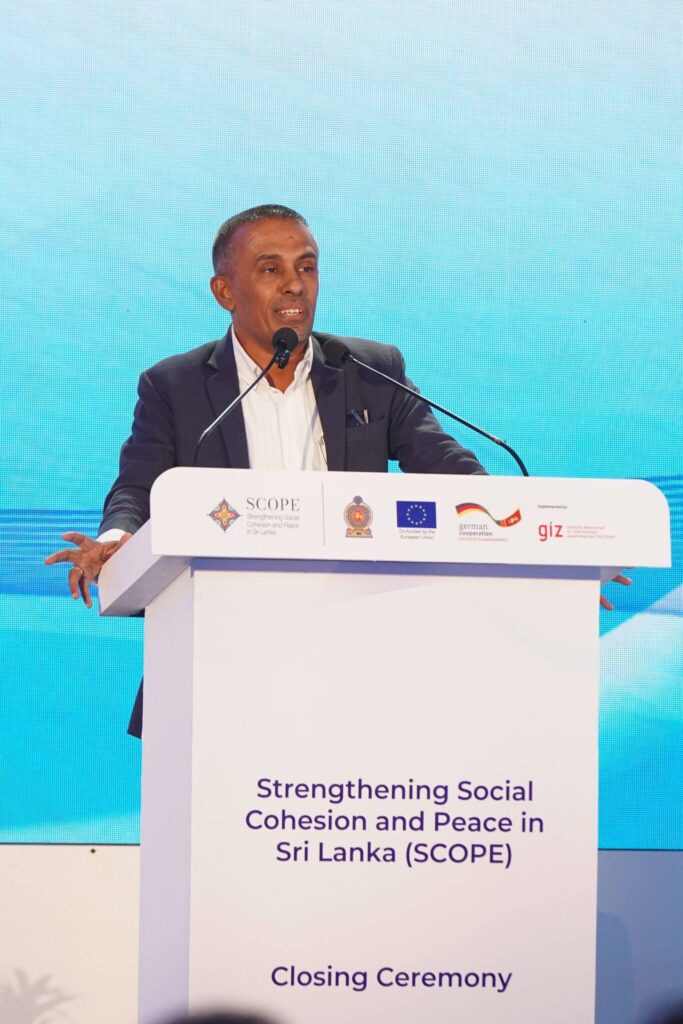




AKD is Forcing Public Servants to the Barracks
By Adolf
The recent arrest of former Finance Secretary and lawyer Charitha Ratwatte by the Commission to Investigate Allegations of Bribery or Corruption (CIABOC) has sent shockwaves through Sri Lanka’s administrative and professional circles. Ratwatte, who also served as a Senior Advisor to a former Prime Minister, was taken into custody over an alleged irregularity in the procurement of five temporary warehouses in 2015, valued at around Rs. 90 million. According to CIABOC, the warehouses were purchased through the Sri Lanka State Trading Corporation, reportedly outside standard procurement procedures. The case stems from a Ministry of Finance decision to store excess paddy at Mattala Airport — a decision that Ratwatte is said to have chaired. Sources close to him maintain that the decision was driven by practical and financial considerations. At the time, warehousing space in Colombo would have cost almost three times as much.
A Question of Judgment, Not Corruption
The real issue here is not whether the Ministry could have found a cheaper warehouse, but whether the decision was made with corrupt intent. Those who know Charitha Ratwatte — across governments and institutions — would affirm that he was blunt, principled, and incorruptible. He has never been associated with personal enrichment or political favouritism. To now subject such a figure to public humiliation over a decision made in good faith sets a dangerous precedent. It raises an alarming question: will every official who takes a firm or unpopular decision now have to fear being handcuffed years later?
The Rise of Fear-Based Governance
By targeting senior public servants for administrative decisions taken under pressure, the AKD administration risks paralyzing the public service. Civil servants, already risk-averse, will become even more cautious — hesitant to sign documents, approve projects, or make timely interventions. Files will pile up, and Sri Lanka’s already sluggish bureaucracy will grind to a halt. When governance becomes driven by fear rather than trust, public administration collapses into inaction. The country’s economic recovery, which depends heavily on confident decision-making within the state machinery, will suffer immeasurably.
A Cycle of Retribution
There is also a broader danger. Vengeful acts only breed more vengeance. If today’s government uses investigative commissions to pursue former officials, tomorrow’s administration will surely return the favour. The cycle of political retribution will deepen, while genuine corruption will continue to flourish unnoticed amid the noise of witch-hunts. The weaponization of accountability institutions will eventually erode public faith in them — turning what should be independent bodies into political instruments.
Chilling Effect on the Private Sector
The implications extend beyond the public service. Business leaders such as Sarath Ganegoda, Hans Wijesuriya, Arjuna Herath, Duminda Hulangamuwa, Pravir Samarasinghe, and Haniff Yusuf — who have at various times contributed their expertise to government or public institutions — will now think twice before doing so again.If professionals risk being dragged into politically motivated investigations years after serving their country, why would any credible private sector leader step forward? The government’s actions risk alienating precisely the kind of talent and experience Sri Lanka needs to drive reform and innovation.
Governance Requires Balance
Accountability is essential to democracy, but it must be guided by fairness, proportionality, and intent. A government committed to reform should strengthen due process, not weaponize it. Investigations must be timely, transparent, and free from political interference. The AKD administration must recognize that good governance is built on confidence, not fear. By persecuting respected administrators for legitimate policy decisions, it risks driving Sri Lanka’s most capable public servants “into the barracks” — afraid to act, afraid to decide, and afraid to serve. In the end, a government that governs through intimidation will find itself surrounded not by bold decision-makers, but by silent clerks. And that, more than any past mistake, will be Sri Lanka’s true tragedy.

Sajith Premadasa is a big beneficiary of AKDs poorly thought out decisions.
Indian financial crimes agency freezes Anil Ambani Group properties worth $853 million
NEW DELHI, Nov 3 (Reuters) – India’s financial crime agency has frozen 75 billion rupees ($853 million) worth of properties linked to companies of the Reliance Anil Ambani Group as part of a money-laundering probe, opens new tab, it said in a statement on Monday.
The move relates to cases involving Reliance Communications Ltd (RLCM.NS), opens new tab and its affiliates over the alleged diversion of about 136 billion rupees and loans of more than $569 million taken by the group from India’s YES Bank (YESB.NS), opens new tab between 2017 and 2019 that the ED says were diverted and laundered.
The troubled conglomerate is owned by the younger brother of billionaire Mukesh Ambani. Reliance Infrastructure, another Anil Ambani Group company, said there was no impact on its operations, shareholders and employees from the ED’s action.
Other group companies did not comment, while YES Bank declined to comment.
AGENCY DETECTS ‘FRAUDULENT DIVERSION OF PUBLIC MONEY’
ED said Reliance Communications Ltd (RLCM.NS), opens new taband its group companies diverted more than 136 billion rupees through loan “evergreening”, a practice where new loans are given to stressed borrowers to enable them to repay existing loans.
ED’s investigation revealed that loans taken by one entity from one bank were utilized for repayment of loans taken by other entities from other banks, transfer to related parties, and investments in mutual funds, which was in contravention to the terms and conditions of the sanction letter of the loans,” the agency said.
The Reliance Group entities are also accused of paying bribes to YES Bank officials before loans were disbursed, a government source had said earlier.
The Reuters
Land Release in Sri Lanka’s North: Balancing Property Rights with National Security Imperatives
By Major General Dr Boniface Perera
- Returning civilian property is a moral obligation, but certain tactically vital lands must remain under military control to safeguard national sovereignty against residual extremist threats
- The release or retention of strategic lands should be determined by defence establishments based on intelligence and tactical value, never by election promises or short-term political gain
The process of releasing military-held land in the Northern Province of Sri Lanka back to its legitimate civilian owners is a necessary and significant step towards post-conflict reconciliation and normalisation. It is an acknowledgement of the fundamental right to property and a move toward restoring the lives of those displaced by a brutal, three-decade-long war. However, this critical process cannot, and must not, be pursued in isolation. It must be meticulously balanced against the paramount and non-negotiable requirement of national security, sovereignty, and territorial integrity. The nation’s history, marked by the violent pursuit of a separate state by extremist elements, mandates an approach that is both compassionate toward the affected citizens and rigorously cautious about potential future threats. This article explores the delicate equilibrium required to satisfy the legitimate demands of the civilian population while simultaneously safeguarding the strategic interests of the state.
The Legitimate Claim and the Context of Conflict
The claim of land owners to their privately held lands is unequivocally legitimate and legal. The state has a moral and legal obligation to facilitate the return of property taken over during the period of conflict or held subsequently for military purposes. This act of restitution is vital for re-establishing normalcy, enabling economic revival, and building trust between the state and its citizens in the North.
The Shadow of the Past
The necessity for national security consideration is underscored by the fact that the conflict was fought by an extremist group, the Liberation Tigers of Tamil Eelam (LTTE), with the explicit intention of carving out a separate state, “Tamil Eelam,” encompassing the Northern and Eastern Provinces. These provinces, which include the districts of Jaffna, Kilinochchi, Mullaitivu, Mannar, and Vavuniya in the North, and Trincomalee, Batticaloa, and Ampara in the East, constitute approximately 28.78% of Sri Lanka’s total landmass. Given the small size of the island nation (65,610 {sq.km} or 25,332 {sq. mi.}), the notion of division poses an existential threat to the state’s coherence and viability. Although the military defeat of the LTTE occurred in 2009, the underlying ideological concept of separatism is perceived by some as not yet entirely extinguished, necessitating continued vigilance against both domestic and overseas extremist remnants.
- Prioritising National Security: A Universal Principle in any sovereign state, the national security interest inherently takes precedence over the legitimate, but individual, rights of a citizen when a clear conflict arises. This is not a slight against the civilian population of the North but a universal doctrine applied in defence of the entire nation. The principle that national security takes precedence is indisputable, but its application must be objective, transparent, and strictly justifiable. To avoid the perception of political or punitive actions, the armed forces must adhere to clear, defence-based criteria for retaining private land.
- Geographical and Strategic Control Points: Tactically important lands are those that confer an overwhelming geographic advantage.
- Chokepoints and Gateways: These include narrow land features that control access between key regions. Elephant Pass, for instance, is the quintessential example, acting as the historical and essential “Gateway to the Jaffna Peninsula”. Control over this isthmus dictates the entire land supply and reinforcement route for the peninsula. Similarly, access points to the mainland (e.g., Poonaryn, Mannar causeway approaches) are vital.
- Commanding High Ground: Lands that offer a significant elevation advantage for observation, surveillance, and artillery fire control over population centres or critical infrastructure (e.g., key points near Jaffna town, Kilinochchi and Vavuniya).
- Coastal and Maritime Security: Areas, particularly near Point Pedro (the island’s northernmost tip), Kankasanturei and Karainagar (a key naval location), that are essential for maritime surveillance, interdiction, and naval operations. Given the history of sea-borne operations and smuggling by extremist elements, these must remain under firm central government/Navy control to safeguard the maritime domain.
- Strategic Palaly Base: A pullout from the Palaly tri-forces complex would effectively cede strategic control of the Jaffna Peninsula. This loss of a primary operating base would severely hamper the ability of the security forces to regain dominance, posing an unacceptable threat to national security
Locations that control key routes, provide crucial observation points, or offer strategic advantages for rapid deployment and defence in the event of a future threat must be retained.
Future Threat Assessment
Retention is justified not just by the past war, but by credible, intelligence-based assessments of future threats.
Lands must be retained if they are deemed essential to counter threats posed by residual extremist elements, foreign state actors, or transnational criminal/terrorist networks that might exploit the North’s geographical position.
In all cases of retention, the state must adhere to a process that ensures adequate, prompt, and just compensation or alternative lands for the owners whose lands are deemed permanently essential for national security. This provides justice to the individual while maintaining the integrity of the state.
- Economic Vitality: Grounds essential for national infrastructure, resource control, or central government administrative continuity should be kept under central authority.
Any decision to retain land must be based on a clear, documented assessment of its tactical value in ensuring the security of the nation against past and potential future threats posed by extremist elements, both within and outside the country. The purpose is solely to ensure national security needs and is not, in any way, intended to diminish the rights or status of the Tamil people as equal citizens of Sri Lanka.
Targeted Infrastructure Investment
A targeted development plan must address the historical and conflict-related deficit in infrastructure.
- Connectivity: Beyond repairing main arteries (like the A9 highway), this means developing feeder roads, rail links (e.g., to Point Pedro and Mannar), and port facilities to ensure the Northern economy is fully integrated into the national and regional markets.
- Utility Modernisation: Investing heavily in reliable electricity grids, modern water treatment and supply systems, and high-speed digital infrastructure to support a knowledge-based economy and attract business process outsourcing (BPO).
Fostering Entrepreneurship and Job Creation
The strategy must shift the region’s economy beyond traditional agriculture and fisheries towards higher-value sectors.
- Industrial Zones: Establishing specialised Industrial Parks in Kilinochchi and Vavuniya focused on sectors where the region has a natural advantage (e.g., food processing, light manufacturing, textiles).
- Diaspora Engagement: Creating a transparent, fast-tracked investment mechanism to encourage the global Tamil diaspora to invest capital and expertise back into their native regions, thereby making them stakeholders in the unified state’s economy.
- Skills Development: Launching targeted vocational and technical training programs (VTA Centres) aligned with projected labour market demand in the new industrial zones and the service sector.
Ensuring Full and Equal Citizenship
Economic development must be accompanied by robust governance and reconciliation measures to ensure social cohesion.
Equality of Opportunity: Actively ensuring transparent and merit-based recruitment into the public sector, law enforcement, and government bodies, with a focus on local representation, to build confidence in the state’s impartiality.
Language Rights: Strictly enforcing the use of the Tamil language in administration, courts, and services across the North and East to affirm the cultural and linguistic rights of the citizens.
Restoration of Public Services: Fully decentralising and strengthening public service delivery in health, education, and municipal services to ensure the North and East receive a quality of life equal to or better than the most developed areas of the South.
Avoiding Political Expediency and Ensuring Integrity
The release of military-held lands is an issue of state policy and national security, not political manoeuvring. The integrity and sovereignty of the nation must not be compromised by decisions driven by short-term political gains or promises made during election cycles.
Beyond the Political Lens
Decisions concerning strategic land retention or release must be determined by the military and national defence establishment, based on security assessments, and not by political expediency. The survival of the state, predicated on its national security, is an issue that must transcend the survival or success of any single political party. The process must be transparent, objective, and solely security-driven, ensuring that no land that is genuinely vital for the nation’s defence is compromised for political gain.
Defeating the Idea: The Strategy of Economic Prosperity and Integration
The long-term defeat of the separatist ideology lies in cultivating a deep-seated feeling of belonging and equal opportunity among the citizens of the North and East. The most effective, long-term strategy for permanently defeating the ideology of separatism is not solely military deterrence. Economic prosperity is the most potent weapon for extinguishing the rationale for a separate state. When citizens feel fully invested and valued in the unified state, the appeal of a separate state diminishes.
By fostering an environment where all citizens, irrespective of their location, race, or religion, can thrive and realise their full potential, the fundamental reason for a struggle for independence will be eliminated. The extremists will lose the narrative and the base of support required to reignite conflict.
Conclusion – A Path of Responsible Reconciliation:
The release of military-held lands in the Northern Province is a challenging, yet necessary, exercise in responsible reconciliation. The path forward requires a firm commitment to two concurrent priorities: the legitimate restitution of private property and the unwavering defence of national security. The ultimate goal is to achieve a stable, prosperous, and unified Sri Lanka where the legitimate property rights of land owners are restored, while the tactical and strategic sites essential for the nation’s defence are retained.
By combining prudent, defence-driven retention of key strategic lands with an aggressive, inclusive economic development strategy, Sri Lanka can navigate the post-conflict challenge successfully. This approach secures the nation’s borders while simultaneously winning the loyalty and allegiance of its citizens in the North and East by making the unified state the undisputed guarantor of their peace, prosperity, and rights.
The writer is an Infantry officer who served the Sri Lanka Army for over 36 years, a former Security Forces Commander of the Wanni Region and Eastern Province, and he holds a PhD in economics.
He can be reached at: [email protected]
Vacuum-Packaging Scandal Exposes Deep Woes at Ceylon Fisheries Corporation
The Ceylon Fisheries Corporation (CFC) is under renewed scrutiny after former chairman Lalith Daulagala and three senior officials were arrested by the Bribery Commission for alleged corruption tied to a 2020 equipment purchase.
The defendants include managing director Chandana Krishantha, supply manager Vijith Pushpakumara and operations manager Anura Chandrasena Bandara.
The accusation centres on the purchase of a vacuum-packaging machine capable of processing up to 2,000 kg of fish per hour that was bought outside the statutory procurement process and, according to the Commission, was unnecessary.
The alleged result: a loss to the government of Rs. 5,856,116. In addition, the supply manager is charged with demanding and accepting a bribe of Rs.100,000, credited to his personal account, in return for releasing part of payment (Rs. 928,058.20) due to the supplier.
When produced before the Colombo Chief Magistrate’s Court, the court granted bail under two surety bonds of Rs. 1.5 million each, and ordered the suspects to surrender passports.
This scandal arrives against a backdrop of long-standing financial fragility at the CFC. Audit reports reveal that for the year ended 31 December 2019 the auditor issued a disclaimer of opinion, citing insufficient audit evidence and significant uncertainties over the corporation’s financial statements.
Earlier reports show that even basic accounting and timely submission of statements have been neglected.
According to sector data, the fisheries industry remains a valuable yet under-optimised part of Sri Lanka’s economy: the marine fish catch in recent years exceeded 400,000 MT, and the fisheries sector contributes about 2.3 % of export earnings.
Within this context, CFC was recently singled out by the Minister of Fisheries, who confirmed that the Corporation had been loss-making, burdened by an excessive payroll and poor management practices, including “malpractices and corruption” which hampered its performance.
In past efforts to reverse the trend, the CFC reportedly implemented a voluntary retirement scheme, reducing about 270 excess employees, and claimed that salary bills were recently covered by its own income rather than relying on Treasury funds.
The arrests expose two critical issues: first, persistent governance and procurement failings within the CFC; second, the broader challenge of turning around a state-owned enterprise that has struggled financially and operationally for years. The immediate financial damage – nearly Rs. 6 million – may appear modest in the macro sense, but for a corporation already lacking credibility and with audit findings pending, it further undermines stakeholder confidence.
Restoring the corporation’s viability will require more than staff reductions or equipment investments. It demands strong leadership, transparent procurement practices, and rigorous financial oversight areas all flagged as weak by the Auditor-General’s Department.
The CFC needs not just to stop bleeding but to articulate a clear turnaround strategy that aligns with the Ministry’s mission of increased value-addition, reduced post-harvest-losses and enhanced export earnings.
With the bribery case proceeding through the courts, the reputational cost already looms large. The question now is whether the CFC can leverage the spotlight to drive meaningful reform and move from being a cautionary tale of state-enterprise mismanagement into an exemplar of recovery in the fisheries sector.
Uncertainty Grows over Sri Lanka’s Duty-Free Oil Quota
Sri Lanka risks losing a lucrative 250,000 ton export quota covering vegetable oils and bakery fats to India under the Indo-Sri Lanka Free Trade Agreement (ISFTA), as investors warn of policy inertia and mounting pressure from regional rivals.
The quota, was introduced in 2008 following negotiations with New Delhi, allowing Colombo-based manufacturers to ship products duty-free into India.
Industry insiders say the facility, worth at least US$50 million annually in foreign exchange, could be reassigned to Nepal or Bhutan if Sri Lanka fails to revive its export capacity.
“This is not just an industrial issue it’s a foreign exchange lifeline,” one Indian investor previously engaged in Sri Lanka’s edible oils sector told Sunday Times Business. “Unless the government acts now, we will lose it.”
Exports began in 2002, and by 2006, twelve factories ten Indian-owned and two Sri Lankan were thriving.
But in 2010, India slashed import duties on edible oils from other suppliers to as low as 5 percent, from 42 percent eroding Sri Lanka’s competitiveness.
Ten factories closed almost overnight. Machinery and equipment were dismantled and sold off, in some cases through politically linked deals, leaving only four companies two Indian and two Sri Lankan to continue operations.
In 2022, India reversed course, raising tariffs again and reinstating Sri Lanka’s quota, while extending approval for bakery margarine and fats. For Colombo, the move was an unexpected reprieve, offering a chance to rebuild capacity.
Yet regional competition looms. Analysts say India may increasingly favor Nepal and Bhutan both tightly bound to New Delhi through trade and political agreements over Sri Lanka.
“If Sri Lanka shows no commitment to using this quota, India has little reason not to shift it northwards,” one South Asia trade analyst noted.
Industry players insist Sri Lanka could quickly capitalise. At least five shuttered factories could be restarted, while two local plants already supplying the domestic market could easily pivot to exports. Together, they could fully utilise the 250,000-ton allocation.
But regulatory roadblocks persist. Companies now fall under the Board of Investment, which demands that outstanding taxes be cleared before operations resume. Investors argue the delay is costing the country dearly.
“The sad truth is that no minister in the present government even understands the importance of this industry,” one investor remarked.
Earnings of “US$50 million a year may not sound transformative, but in Sri Lanka’s fragile balance of payments context, every dollar counts,” said a Colombo university-based economist. “Losing this to Nepal or Bhutan would be a policy own goal.”
For now, the quota remains on paper. But without swift political will, Sri Lanka risks ceding yet another trade advantage this time not to global markets, but to its smaller Himalayan neighbors.


